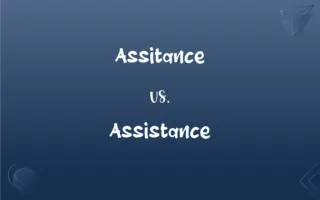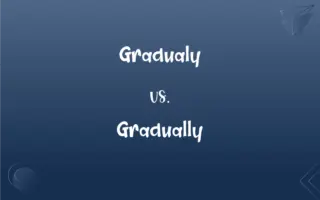Appatite vs. Appetite: Mastering the Correct Spelling
Edited by Aimie Carlson || By Janet White || Published on March 28, 2024
'Appatite' is an incorrect spelling; the correct spelling is 'appetite,' which refers to a natural desire for food."

Which is correct: Appatite or Appetite
How to spell Appetite?

Appatite is Incorrect

Appetite is Correct
ADVERTISEMENT
Key Differences
Remember "i" for "ingestion" in "appetite" to get the spelling right.
Think of "pet" in "appetite" to remember the craving for food.
"Appetite" has two "p"s like "pepper," which is often added to food.
Recall "te" at the end of "appetite" stands for "to eat," emphasizing the correct spelling.
Use "appetite" as "appetizing," linking the correct spelling with food desire.
ADVERTISEMENT
Correct usage of Appetite
The medication decreased his appatite.
The medication decreased his appetite.
He had a big appatite after the long hike.
He had a big appetite after the long hike.
Her appatite for knowledge was insatiable.
Her appetite for knowledge was insatiable.
A healthy appatite is a sign of good health.
A healthy appetite is a sign of good health.
She tried to control her appatite to lose weight.
She tried to control her appetite to lose weight.
Appetite Definitions
The psychological feeling of hunger.
The sight of food triggered his appetite.
A natural desire to satisfy a bodily need, especially for food.
Her appetite for adventure was insatiable.
A specific craving for something.
He has a big appetite for Italian food.
An instinctive physical desire, especially for food or drink.
After the hike, their appetite was huge.
A desire or liking for something.
She has an appetite for learning languages.
An instinctive physical desire, especially one for food or drink.
A strong wish or urge
An appetite for learning.
Appetite Sentences
The chef's dishes are sure to whet your appetite.
Having a good appetite is important for growing children.
Her appetite for adventure took her around the world.
An increase in physical activity can boost your appetite.
Her voracious appetite for books made her a frequent library visitor.
Stress often affects people's appetite negatively.
The appetizer was so delicious, it whetted our appetite for more.
He lost his appetite when he felt nervous.
His appetite for risk made him a successful entrepreneur.
Anxiety can lead to either an increase or decrease in appetite.
Seasonal changes can sometimes influence your appetite.
A good night's sleep can help regulate your appetite.
A hearty breakfast can satiate your morning appetite.
Watching cooking shows always stirs up my appetite.
Some herbs are known to naturally suppress appetite.
Certain medications can have side effects that include changes in appetite.
After the workout, she had a huge appetite.
People often confuse thirst with appetite, leading to overeating.
Illness can sometimes cause a decrease in appetite.
A walk before dinner can be a great appetite stimulant.
An appetite for learning is essential for personal growth.
A decrease in appetite can be a sign of emotional distress.
A balanced diet should satisfy your appetite and nutritional needs.
Maintaining a healthy appetite is crucial for proper nutrition.
Cultivating an appetite for healthy foods can improve your overall well-being.
Appetite Idioms & Phrases
Whet your appetite
To stimulate one's interest or desire for something.
The preview was meant to whet your appetite for the upcoming movie.
Work up an appetite
To do something that makes you become hungry.
The long hike through the forest really worked up an appetite.
Lose one's appetite
To lose one's desire to eat.
The thought of going back to work on Monday made her lose her appetite.
Suppress one's appetite
To intentionally decrease one's desire to eat.
Drinking water before meals can help suppress one's appetite.
Appetite for destruction
A strong desire to cause damage or chaos.
The villain in the movie had an undeniable appetite for destruction.
Have an appetite for
To have a strong desire or interest in something.
She always had an appetite for adventure and exploration.
Insatiable appetite
An unquenchable desire or hunger for something, often not related to food.
His insatiable appetite for knowledge led him to read incessantly.
Satisfy an appetite
To fulfill a desire for food or another need.
The hearty meal fully satisfied our appetite.
Satiate the appetite
To satisfy the desire or need fully.
The gourmet meal was enough to satiate the appetite of even the most discerning guests.
A big appetite
A large desire for food or possibly an eagerness for something non-food related.
He always had a big appetite, so buffets were his favorite dining option.
Restore one's appetite
To bring back the desire to eat.
After recovering from the flu, her favorite meal helped restore her appetite.
Voracious appetite
An extremely huge desire to eat, or metaphorically, a huge desire for something non-food related.
The young reader's voracious appetite for books was impressive.
Wet one's appetite
To increase one's desire or interest in something.
The first chapter of the book really wet my appetite to read more.
Appetite for risk
Willingness to engage in risky or dangerous activities.
His appetite for risk made him a standout entrepreneur in the competitive tech industry.
Curbing one's appetite
Taking steps to reduce one's hunger or desire.
Eating small, frequent meals can help in curbing one's appetite.
Appetite comes with eating
The more you have of something, the more you want.
Her initial success in the stock market gave her an appetite for more investments.
Stimulate the appetite
To make someone feel more hungry or eager.
The smell of freshly baked bread can stimulate the appetite.
Appetite for success
A strong desire to achieve success.
His appetite for success drove him to work tirelessly.
Have a healthy appetite
To have a good desire to eat, indicating good health.
The child's healthy appetite was a relief to her parents.
Appetite for life
A strong desire to live life to the fullest.
Even in her old age, she had an undiminished appetite for life.
Appetite for learning
A strong desire to learn and acquire knowledge.
Her appetite for learning made her an excellent student.
Appetite suppressant
Something that decreases one's desire to eat.
Some people use green tea as a natural appetite suppressant.
FAQs
Why is it called appetite?
It's called appetite because it derives from Latin "appetitus," meaning desire or inclination, particularly towards food.
What is the root word of appetite?
The root word of appetite is the Latin "appetitus," meaning desire or inclination.
Which vowel is used before appetite?
The vowel used before "appetite" in phrases is context-dependent, not specified by the word itself.
What is the plural form of appetite?
The plural form is "appetites."
Which preposition is used with appetite?
Prepositions like "for" are commonly used with appetite (e.g., appetite for food).
What is the verb form of appetite?
There is no direct verb form of "appetite"; related actions are described with verbs like "crave" or "desire."
What is the pronunciation of appetite?
The pronunciation of appetite is /ˈæpɪˌtaɪt/.
Is appetite an adverb?
No, appetite is not an adverb.
Is appetite an abstract noun?
Yes, appetite is an abstract noun.
Is appetite a noun or adjective?
Appetite is a noun.
Is appetite a negative or positive word?
Appetite is neutral; context determines its positive or negative connotation.
Is appetite a countable noun?
Yes, appetite is a countable noun.
Is the word appetite imperative?
No, appetite is not an imperative; it is a noun.
What is the singular form of appetite?
The singular form is "appetite."
Which conjunction is used with appetite?
Conjunctions used with appetite vary by context; "and" is common (e.g., hunger and appetite).
Is appetite a collective noun?
No, appetite is not typically considered a collective noun.
What part of speech is appetite?
Appetite is a noun.
What is the first form of appetite?
Appetite itself is a noun; it does not have verb forms like first or second form.
Which article is used with appetite?
The indefinite article "an" or the definite article "the" can be used with appetite.
How many syllables are in appetite?
There are three syllables in "appetite."
What is a stressed syllable in appetite?
The first syllable, "ap," is stressed in "appetite."
What is another term for appetite?
Another term for appetite is "hunger" or "craving."
Is appetite a vowel or consonant?
Appetite is neither; it is a noun. The question applies to letters, not words.
Is the appetite term a metaphor?
Appetite can be used metaphorically to describe desires beyond food.
Which determiner is used with appetite?
Determiners like "an," "the," or "no" can be used with appetite.
What is the second form of appetite?
As a noun, appetite does not have verb forms.
How do we divide appetite into syllables?
Appetite is divided into syllables as ap-pe-tite.
What is the opposite of appetite?
The opposite of appetite could be "satiety" or "fullness."
What is the third form of appetite?
Appetite, being a noun, does not have verb forms.
How is appetite used in a sentence?
Example: "His appetite for knowledge made him an excellent student."
About Author
Written by
Janet WhiteJanet White has been an esteemed writer and blogger for Difference Wiki. Holding a Master's degree in Science and Medical Journalism from the prestigious Boston University, she has consistently demonstrated her expertise and passion for her field. When she's not immersed in her work, Janet relishes her time exercising, delving into a good book, and cherishing moments with friends and family.
Edited by
Aimie CarlsonAimie Carlson, holding a master's degree in English literature, is a fervent English language enthusiast. She lends her writing talents to Difference Wiki, a prominent website that specializes in comparisons, offering readers insightful analyses that both captivate and inform.


































































